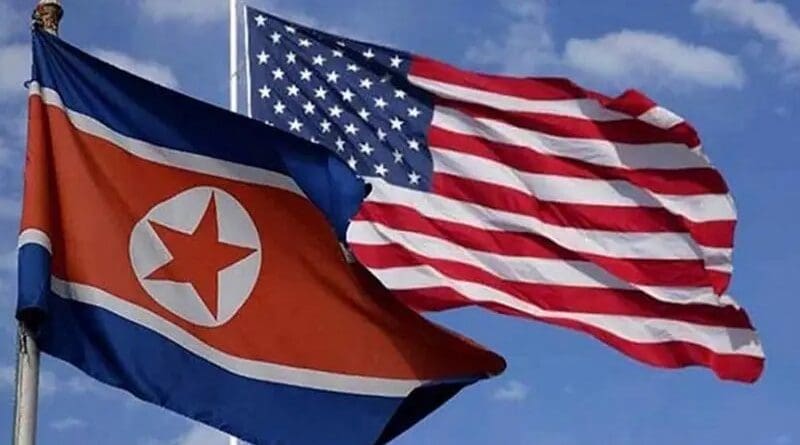Trump And The Problem Of North Korea Nuclear Identity – OpEd
By Iran Review
By Shahrouz Shariati*
Constructivists consider normative structures and social identities as two basic ontological principles to be taking into consideration when analyzing foreign policy and international relations. Therefore, while neorealist analysts put more emphasis on “the material structure of the balance of military power,” constructivists believe that “ideas,” “notions,” and “identities” also enjoy structural characteristics and have an effective influence on social and political actions of countries. From this viewpoint, “the nuclear identity” of North Korea, along with the political identity of three generations of this country’s leaders during the past six decades, has been considered as one of serious obstacles preventing Pyongyang from getting close to the West and its allies.
In recent weeks, Western media have been showing excessive optimism about the beginning of negotiations between the United States and North Korea following a possible visit to Pyongyang by US President Donald Trump. However, it seems that historic meetings between the two countries’ senior officials have been mostly an indication of a change in the form of confrontation between Washington and Pyongyang from a military phase to negotiating table, rather than being a sign of the possible resolution of the two sides’ differences in the near future. A particular example of those visits was a recent secret trip to North Korea by Mike Pompeo, the former head of the CIA and the current US secretary of state, in early April 2018, during which he met and conferred with North Korean leader, Kim Jong-un. This process has been repeated in the past quarter of a century under various US administrations, including those of President Bill Clinton, President George H. W. Bush and his son, and President Barack Obama. At the present time, President Donald Trump is also busy with this process.
From this viewpoint, the main factor that sets the course of developments on the Korean Peninsula is not military equations, but is the way that diverging ideas and notions related to the nuclear identity of North Korea are adapted to those of the West, especially Trump, with respect to building security on the Korean peninsula. In better words, the “nuclear identity” of North Korea, which has been led by the “Kim” family for three consecutive generations, has not merely imposed heavy costs on the country but has had benefits too. Therefore, at least in the medium term, only gradual change in the way that North Korean leaders understand the outside world can have any effect on the course of developments on the Korean Peninsula. At the present time and after the lapse of more than six decades, normative structures and ideological conceptual systems in North Korea are considered as effective factors that determine how material environments are interpreted by people and leaders of this country. In addition, understanding of how interests are formed in North Korea is necessary for the resolution of this crisis. In fact, as put by Erik Ringmar, “identities make interests and interests give birth to actions which, in turn, are the origin of actions and behaviors in foreign policy, and at the same time, determine what actions are legitimate or illegitimate in the political culture of a country.”
Regardless of what said before, it must be noted that a major achievement of this model when assessing the crisis on the Korean Peninsula is that the identity emanates from “others” and North Korean leaders and people have come up with a distinguished identity for themselves during the past 65 years and in the face of the United States’ Cold War-style policies. Therefore, they cannot easily trust promises given by leaders of that country or cooperate with it.
The leaders of North Korea, who have always hit the military headlines in the international media and even made the necessity of developing nuclear weapons part of their constitution, believe that such weapons are an indispensable part of their security and national identity. Therefore, they may only agree to negotiation over this identity when those talks are proven to have many guaranteed benefits for them. North Korea has conducted six successful nuclear tests in the past twelve years alone and the effective range of this country’s ballistic missiles, which can carry a nuclear warhead, has been estimated at up to 1,500 kilometers. Given North Korea’s ability to successfully test a hydrogen bomb and under conditions when experiences of Iran, Libya and even past experiences of North Korean leaders have shown that the United States cannot be a trustworthy partner to any nuclear talks, it seems that the young leader of North Korea will not be able to easily harm the identity and credit of his family and country to get a cheap agreement through taking part in a banquet with his American counterpart.
All told, the nuclear identity of North Korea, which is a mental and psychological construct, along with this country’s experience of past negotiations on nuclear disarmament, allow some degree of predictability as to the future course of developments in this region. In other words and as put by constructivists, a world without identities is a chaotic, divided and insecure world, which is even riskier than an anarchic world. From this viewpoint, identities have three essential functions in any society and, in fact, by introducing us to others and introducing others to us, they determine priorities and measures to be taken afterwards. As a result, North Korea embarks on defining its “national interests” on the basis of the understanding and conception that it has of its nuclear and military identity. At the end of the day, the behavior of North Koreans in their foreign relations is more a product of this definition of national interests than diplomatic exchanges.
* Shahrouz Shariati
Assistant Professor of Political Science; Tarbiat Modares University

